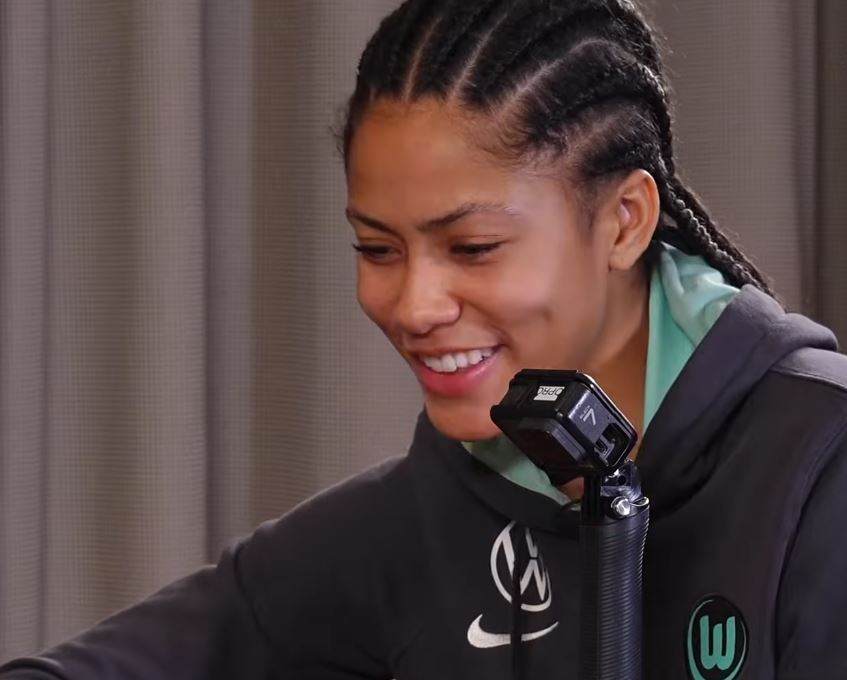Sveindís Jane Jónsdóttir wasn’t born out of Iceland’s football scene; rather, she was molded by it, influenced by the layers of her ancestry, and constantly encouraged by the two people who knew her the best. Throughout her life, her parents, Jón Sveinsson and Eunice Quayson, have continued to play a silent but significant role. Their impact has been incredibly successful in stabilizing Sveindís during changes, victories, and the high-stakes world of professional sports, despite not being highlighted by interviews or headlines.
Sveindís was raised in a home where two very different continents coexisted in unexpected harmony. He was born in Keflavík, a fishing village renowned for its strong winds and tight-knit community. Locals characterize her father, Jón, who is distinctly Icelandic, as kind and reflective—a man who prioritizes dedication over festivities. Eunice, her Ghanaian mother, brought in the flavors of her own culture through food and storytelling, adding warmth and rhythm to that stable household dynamic.
Biographical Information for Sveindís Jane Jónsdóttir
| Full Name | Sveindís Jane Jónsdóttir |
|---|---|
| Date of Birth | June 5, 2001 |
| Birthplace | Keflavík, Iceland |
| Nationality | Icelandic-Ghanaian |
| Father’s Name | Jón Sveinsson |
| Mother’s Name | Eunice Quayson |
| Height | 1.76 m (5 ft 9 in) |
| Playing Position | Forward |
| Current Club | Angel City FC (USA) |
| Youth Club | Keflavík |
| National Team | Iceland Women’s National Team |
| Major Achievements | Bundesliga Winner, Icelandic Player of the Year, UEFA WCL 4-goal record |
Their union produced perspective in addition to a secure home. Growing up in a multicultural environment in Keflavík gave Sveindís a special perspective that helped her negotiate her identity. Her status as a dual-heritage athlete is especially advantageous in a society that is still getting used to greater diversity, demonstrating how inclusive ideals can promote global success.
She was constantly urged to maintain her groundedness as a young athlete. According to reports, her parents went to as many games as they could, with her mother beaming proudly from the sidelines and her father frequently standing quietly among other parents. Others emphasized her character, reminding her of discipline, humility, and the honor of representing something bigger than herself, while others discussed her goals, pace, or prospects in European leagues.
With her debut with Keflavík’s senior team at the age of 14, she was already drawing attention. She ended the 2016 season with 27 goals in just 19 games. Her instinct for scoring goals was extremely effective, and her subsequent journey from Breiðablik to Wolfsburg and finally to Angel City FC has been nothing short of inspirational. The unwavering support of two parents who recognized that talent alone does not sustain a career is the driving force behind this ascent. Values do.
Sveindís developed during her time with VfL Wolfsburg in Germany, going beyond simply accruing goals and awards. She became the first Icelander to score four goals in a UEFA Women’s Champions League game in 2022, winning the Bundesliga and making history. That kind of accomplishment calls for mental clarity and cultural confidence in addition to keen intuition. The impact of her family had never been more apparent.
Sveindís has demonstrated his remarkable versatility on the field through calculated career moves and appearances for the national team, earning over 50 caps to date. She transitions between club and international roles with ease, displaying resiliency when sidelined and making memorable returns, such as when she was sidelined for six weeks in 2021 and came back stronger than ever. She carries the tenacity of her mother’s family and the fortitude of her father’s with her every time she takes the field.
The way that Sveindís’ background subtly questions convention is what makes it so inventive. Her story offers a new narrative in a nation where homogeneity was once accepted as the norm; this narrative is becoming more popular as Iceland becomes more culturally diverse. Similar to Nadia Nadim or Eniola Aluko, Sveindís is helping to change the way that national identity is viewed in European sports.
Her decision to pursue her skills in the NWSL, where she will play for Angel City FC until 2027, points to a career characterized by deliberate development. Angel City is more than just a team; it’s a franchise that represents equity, diversity, and player empowerment. This move fits in perfectly with Sveindís’s personal path. Her parents’ values are finding a new platform, and the timing couldn’t be more ideal.
Her presence in Los Angeles is a symbol for young athletes juggling dual heritage, in addition to providing fans with excitement. Sveindís is a symbol of belonging for people who have struggled with identity issues or wondered where they fit into a community. Frequently without uttering a single word, she reminds them that excellence need not pick a side. The intersections are where it grows.
In every pass, sprint, and celebration, Sveindís pays tribute to her parents while assimilating into new cultures without losing the beat of her heritage. Despite staying in the background, Jón and Eunice have always played a significant part. They are the silent creators of her attitude, the cornerstone of her work ethic, and the voices in her mind that remind her to maintain her concentration.



